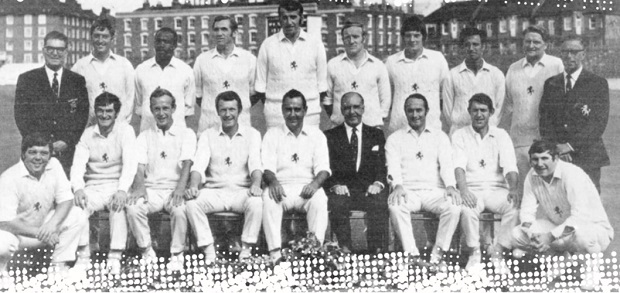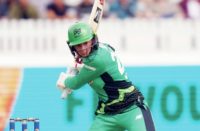By Neil Fissler
KENT celebrated their centenary in 1970 and it appeared that there would be little to celebrate by July 1 when they were bottom of the County Championship.
They had only won once in nine games and were out of the Gillette Cup and the management had decided that they had enough.
The players were called into the dressing rooms at Maidstone by secretary Les Ames where off-spinner Graham Johnson remembers they were told a few home truths.
It was a meeting that was to change the course of the season. It was decided that Kent would play more attacking cricket in a bid to gain more batting points. At the time it was possible to gain an unlimited number of bonus points and after the meeting Kent went onto win 50 batting points in the final 15 matches.
After going unbeaten in their final 13 games, including a draw against Surrey at the Oval in the final game, they secured the Championship, 17 points clear of Glamorgan.
“There was the famous meeting at Maidstone, which set the tone of what are we going to do about being bottom of the table,” Johnson said.
“I can’t remember exactly what Les said but the first bit wasn’t complimentary but once he calmed down he asked, ‘what are we going to do about it’.
“We didn’t feel we’d played that badly, we just hadn’t grabbed the chances in matches.
“One or two hands went up and to ask what was the game plan. It was probably a typical heated dressing room. A lot of words were said, people getting things off their chest.
“Then we got into the more positive aspects of what we were going to do about it and how we were going to make it work. There was a much more positive vibe, attacking things instead of waiting for things to happen.
“It was one of those things that didn’t take much, we weren’t playing badly, it just hadn’t clicked and when we did it became a catalyst and we got on to a roll.”
Johnson, now Kent’s chairman of cricket, also remembers how an off-the-cuff remark made when the new pavilion at the St Lawrence ground was opened had an effect.
“When the new pavilion was opened we were bottom of the table and someone asked the dignitary who opened it what he thought of the new building,” said Johnson.
“And the answer was, ‘too good for this team’. That was a bit of a motivator but we were already on the road by then.
“To win the County Championship for the first time since 1918, or something like that, was very special especially in the Centenary year.”
BACK ROW (LEFT-RIGHT):
Len Kilby: Chief physio at Canterbury Hospital before becoming physio and medical attendant for five years before his death in July 1974, aged 69.
Bob Woolmer: All-rounder with Kent and England. A sales rep for ICI before turning professional and taught in Kent and South Africa. He was Pakistan coach at the time of his unexpected death during the World Cup in March 2007, aged 58.
John Shepherd: All rounder with Kent, Gloucestershire and West Indies. Cricket professional at Eastbourne College and then ICC regional development officer for the Americas, also worked for a Travel company escorting England cricket tours.
Alan Brown: Fast bowler with Kent and England. Also played non-league football in Kent was a sales for New Northfleet Paper Mills and then a postman in Gravesend.
Norman Graham: Seamer with Kent and Northumberland where he lives in his native Hexham and works in the financial services industry.
John Dye: Left-arm seamer with Kent and Northants. Ran his own private coaching courses, coached in South African schools and was professional at Wellingborough School.
Graham Johnson: Opening batsman and useful off-break bowler has spent 30 years in the financial services and sports and events sectors. Brother-in- law of the late Graham Dilley.
Asif Iqbal: Batsman who played Kent and Pakistan. Has served the ICC as a match referee and ambassador, he ran the Cricketers Benefit Fund Series and was sports coordinator with ARY Digital in London.
Colin Page: Served Kent as cricket manager between 1975 and 1980 then for ten years as director of youth coaching until his death in Tunbridge Wells, December 1990, aged 60.
Claude Lewis: Played for Kent either side of World War Two, he was a coach and scorer until 1988. Died in April 1993, at 84.
SEATED (LEFT-RIGHT):
David Nicholls: Wicketkeeper and opening batsman, went onto work for sports company Lillywhite Frowd based in Tonbridge. Died in Dartford June 2008, aged 64
Alan Knott: Wicketkeeper-batsman who played for Kent and England. He then spent 14 years as specialist wicketkeeping coach to England teams and worked in the media. He now splits his time between Cyprus and Kent.
Derek Underwood: Left-arm spinner, ‘Deadly’ played for Kent and England and went to work for the Turf Club and was director of sales until retiring in 2012.
Mike Denness: Batsman. Only Scottish-born captain of England. Played for Scotland, Kent, Essex and England. He became an ICC match referee and worked in insurance, finance and public relations and died in London, April 2013, aged 72.
Colin Cowdrey: Batsman with Kent and England. After retiring he continued to serve the game as an administrator. Made a life peer in 1997 becoming Lord Cowdrey of Tonbridge and diedin Littlehampton, West Sussex, December 2000, aged 67.
Les Ames: Former England wicketkeeper was Kent manager then secretary/manager from 1957 to 1972. He died in Canterbury February 1990, aged 84.
Stuart Leary: South African batsman also played football for Charlton Athletic, and England U23s. Became director of coaching for Western Province CU and manager-coach of the University of Cape Town FC when he died on Table Mountain August 1988, aged 55.
Brian Luckhurst: Batsman who also served England was Kent coach and marketing manager and then manager of the Ames Levett sports centre at Canterbury. He was club president when he lost a battle with cancer in March 2005, aged 66.
Alan Ealham: Batsman was Kent’s director of youth coaching, he coached King’s School and Junior King’s School for ten years before his retirement. His son Mark played for Kent and England.















